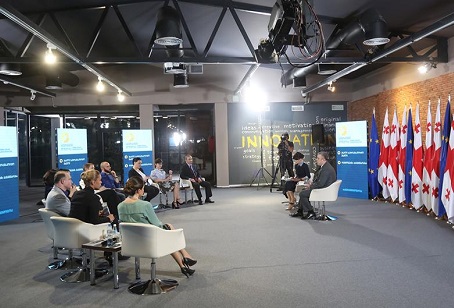PM Kvirikashvili face to face with country’s leading journalists Highlights of the three-hour Q&A

Georgia’s top political journalists had a chance to ask some acute questions to the country’s Prime Minister Giorgi Kvirikashvili last night.
The live broadcasting of the PM’s interview with anchors of Georgia’s leading political talk shows lasted for three hours on Georgia’s public TV.
The interview covered a number of issues, including Georgia’s economic development, intended reforms, foreign policy and upcoming parliamentary elections to be held on October 8.
Agenda.ge has collected the highlights of the interview for you.
Reforms in action
In his welcome speech before journalists, Kvirikashvili made highlights of the last three years and his vision of the future.
The PM stressed the previous years had been full of challenges and the current Government managed to successfully resolve a range of social and political issues.
One part of @GovernmentGeo’s #4PointReformplan#Georgia is #ReformofEconomy which includes #taxreform,financing of start-ups and others
— Giorgi Kvirikashvili (@KvirikashviliGi) April 15, 2016
However the PM added now Georgia faced new challenges that required a different approach and the Government was ready to overcome these issues.
The PM stressed the Government initiated a four-point political agenda that envisaged large-scaled, fundamental changes in the state in four main directions:
- Economy;
- Education;
- Governance system; and
- Infrastructure.
Kvirikashvili believed this reform agenda could play a vital role against the current problems.
He said a market-based education system and development of vocational education, high-level reforms to develop the economy, (annulling of income tax among them) large-scaled infrastructural works and a reform of the governance system to provide fast service and information would be crucial to overcome the existing challenges.
"Our future social policy will be more focused on those with special needs,” he added.
Kvirikashvili also slammed the practice of overspending on comfortable vehicles by public servants and said: "In a country with a low income money must not be spent on luxurious cars or offices.”
"However, when it comes to salaries, it must be competitive otherwise state institutions will lack qualified staff.”
Talking about domestic politics, Kvirikashvili stated he had good relations with Georgia’s former Prime Minister and the founder of the Georgian Dream coalition Bidzina Ivanishvili, but he was never influenced by the ex-PM as he always had his own views and attitudes.
Elections are almost here
The PM also touched on the upcoming October Parliamentary Elections and said there would be no Georgian Dream (GD) coalition in the race, as political parties would participate in the elections alone.
On this note the PM said the process was "completely democratic”, in line with high European standards.

Prime Minister of Georgia Giorgi Kvirikashvili. Photo by the PM's press office.
The PM promised very transparent, fair and peaceful elections, as well as a renewed Georgian Dream party.
Kvirikashvili said there would be new faces in the party, selected according to their sincerity to the public, openness and professionalism.
"The election list of the Georgian Dream Party will be composed by the professionals already known or less known to public,” he said, adding he would not be the only person to fill the list as the Party team would work together on this issue, but he said he would be responsible for the selected people’s future activities.
Ever-stronger Euro-Atlantic aspirations
Kvirikashvili has told journalists his Government’s top priority was Georgia’s fast Euro-Atlantic integration.
Meanwhile he also highlighted that confronting Russia would not be profitable and reasonable for Georgia’s development and stability.
The PM believed Georgia should continue involvement in the Geneva International Talks and retain a special format of Abashidze-Karasin meetings to ease relations with Russia.
The PM stressed a desperate ‘cry’ that Russian militants were stationed on Georgian soil could only hinder the inflow of investments.
He stressed his Government had achieved "big progress” as they continually raised the issue of Georgia’s occupied regions before the international community and at the same time kept stability in Georgia through holding dialogue with Russia.
At the same time, Kvirikashvili excluded any strategic cooperation with non-parliamentary opposition parties of Democratic Movement-United Georgia and Alliance of Patriots.
"If any expectations over such a partnership exit for the upcoming elections or in the future, I am ready to dismiss them,” he said.
The Democratic Movement-United Georgia run by the country’s ex-Parliament Chairperson Nino Burjanadze and Alliance of Patriots chaired by former journalist, Irma Ivashvili, supported closer ties with Russia.
Sex tapes scandal
A part of last night’s interview was devoted to the recent sex videos leak on the internet. Kvirikashvili said he would do his utmost to end speculating with people’s private lives in Georgia.
”I will be the guarantee that my Government will take the path that will end this illegal approach. I will do my best to end illegal surveillance,” the PM said and noted the videos reflecting private lives were kept and spread by those who opposed Georgia’s progress and current Government’s achievements.
The PM said previous state leadership promoted progress in various directions, but from 2007 it created s "horrific" situation in the country as they focused on blackmailing and threatening of its people.
The PM refrained from widely speaking about the former United National Movement (UNM) government as he believed thinking and acting for better future was more essential.

A picture with the journalists after the interview. Photo by the PM's press office.
After the interview, the journalists involved noted the PM seemed to be honest, friendly, and was not ashamed to admit his team’s mistakes but tried to justify these mistakes.
Meanwhile the PM’s Administration said the country’s top official would continue such meeting with journalists in the future, with regional media, print and online journalists coming next, respectively.
 Tweet
Tweet  Share
Share